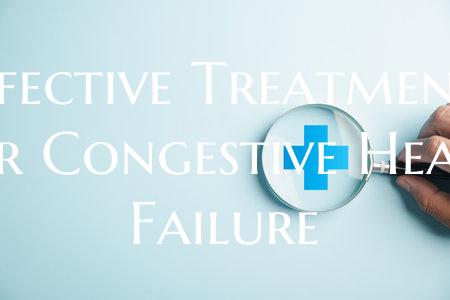
Effective Treatments for Congestive Heart Failure
Here is the content related to the title "Effective Treatments for Congestive Heart Failure":
Congestive heart failure (CHF) is a chronic condition in which the heart is unable to pump blood efficiently to meet the body's needs. This condition can cause a range of symptoms, including shortness of breath, fatigue, and swelling in the legs and abdomen. However, with the right treatment and lifestyle changes, individuals with congestive heart failure can effectively manage their symptoms and improve their quality of life.
1. Medications: Several medications are commonly prescribed to manage congestive heart failure. ACE inhibitors, beta-blockers, diuretics, and aldosterone antagonists are often used to help the heart pump more efficiently, reduce blood pressure, and prevent fluid retention. Entresto, a combination of sacubitril and valsartan, has also shown promising results in improving outcomes for individuals with CHF.
2. Lifestyle Changes: Making healthy lifestyle choices is crucial in managing congestive heart failure. A heart-healthy diet low in sodium and saturated fats can help control blood pressure and reduce strain on the heart. Regular exercise, under the guidance of a healthcare provider, can improve heart function and overall health. Quitting smoking and limiting alcohol consumption are also important steps in managing congestive heart failure.
3. Cardiac Rehabilitation: Cardiac rehabilitation programs offer a structured approach to improving cardiovascular health for individuals with heart conditions, including CHF. These programs typically include supervised exercise sessions, education on heart-healthy habits, and support to help individuals manage their condition effectively.
4. Medical Procedures: In some cases, medical procedures may be recommended to treat congestive heart failure. These can include implanting devices such as pacemakers or implantable cardioverter-defibrillators (ICDs) to help regulate the heart's rhythm. In severe cases, heart surgery, such as coronary artery bypass grafting or heart valve repair or replacement, may be necessary to improve heart function.
5. Monitoring and Follow-up Care: Regular monitoring and follow-up care are crucial in managing congestive heart failure. Healthcare providers will typically track symptoms, monitor medication effectiveness, and adjust the treatment plan as needed to optimize outcomes. Patients are encouraged to communicate any changes in their condition or symptoms to their healthcare team promptly.
In conclusion, effective treatments for congestive heart failure focus on a combination of medications, lifestyle changes, cardiac rehabilitation, medical procedures, and ongoing monitoring and follow-up care. With a comprehensive approach to management, individuals with CHF can effectively control their symptoms, improve heart function, and enhance their quality of life.